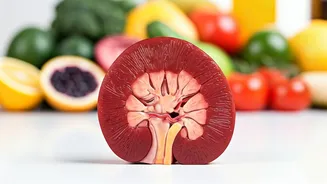Kidneys: Vital Filters
The kidneys are indispensable organs, functioning as the body's primary filtration system. They expertly remove waste products and excess fluids from the blood,
maintaining a healthy balance of electrolytes and regulating blood pressure. Kidney health is intrinsically linked to overall wellness; therefore, safeguarding these essential organs is a vital aspect of health. Issues such as chronic kidney disease (CKD) can have widespread health implications. By adopting a kidney-friendly diet, one can significantly reduce the risk and slow the progression of kidney-related complications. This proactive approach underscores the importance of nutritional choices in preserving kidney function and promoting long-term health.
Consume: Embrace Blueberries
Blueberries are a nutritional powerhouse, especially beneficial for kidney health. Abundant in antioxidants, they combat oxidative stress and inflammation, key factors in kidney damage. They are also packed with vitamins and minerals, supporting overall health. Blueberries are not only delicious but also versatile. They can be added to smoothies, enjoyed as a snack, or included in breakfast cereals, offering a convenient way to boost kidney-friendly nutrition. Furthermore, the compounds found in blueberries can help protect against cell damage, contributing to improved kidney function and overall well-being. Regular consumption of blueberries has been associated with enhanced urinary tract health, underscoring their significance in a kidney-conscious diet.
Consume: Red Bell Peppers
Red bell peppers are rich in nutrients and low in potassium, making them an excellent choice for kidney health. They are a great source of vitamins A, C, and B6, as well as antioxidants like lycopene. The antioxidants present in red bell peppers help to protect kidney cells from damage. Moreover, their low potassium content is crucial for those managing kidney disease, as the kidneys may not efficiently eliminate excess potassium. Red bell peppers can be added to various dishes. They are delicious when roasted, sautéed, or added raw to salads, and offer a flavorful, healthy component to meals. Including these vibrant vegetables in your diet supports kidney function while providing essential vitamins and minerals.
Consume: Fatty Fish
Fatty fish, such as salmon, are rich in omega-3 fatty acids, crucial for various health benefits, including kidney health. Omega-3s possess anti-inflammatory properties, which can help to reduce inflammation throughout the body and may slow the progression of kidney disease. These healthy fats also contribute to cardiovascular health, indirectly benefiting the kidneys, as kidney function and heart health are closely related. Besides, fatty fish provide high-quality protein, essential for maintaining muscle mass. Incorporating fatty fish into a kidney-friendly diet can improve overall health and support kidney function. Preparing fatty fish through baking or grilling rather than frying maintains its health benefits. Consider adding it to your weekly meal plan for a nutritional boost.
Consume: Olive Oil
Olive oil is a beneficial dietary addition for individuals focused on kidney health. It's a source of monounsaturated fats, which are heart-healthy and support overall wellness. It's also known for its antioxidant properties, safeguarding kidney cells from harm. Olive oil can be used in numerous ways in cooking and is a flavorful substitute for other fats. Olive oil can be incorporated into salads, used for sautéing vegetables, or as a finishing touch to many dishes. Moreover, olive oil supports blood pressure control, which is essential for kidney health. When choosing olive oil, opt for extra virgin, which is less processed and retains more of its antioxidants. Including olive oil in the diet provides both health benefits and culinary versatility.
Avoid: Processed Foods
Processed foods are generally detrimental to kidney health due to their high sodium, phosphorus, and sometimes potassium content. The elevated levels of sodium can strain the kidneys, contributing to high blood pressure, a significant risk factor for kidney disease. Similarly, the excessive phosphorus levels may disrupt the delicate balance of minerals in the body, placing extra stress on the kidneys. Many processed foods contain artificial additives and preservatives that can further burden kidney function. Foods to avoid include pre-packaged snacks, fast food, and canned items. Avoiding processed foods, and instead focusing on whole, unprocessed foods, can support kidney health, helping to prevent the progression of kidney disease and improving overall well-being. Reading food labels carefully and choosing fresh ingredients are essential steps.
Avoid: High-Potassium Foods
Excess potassium can pose a challenge for people with impaired kidney function, as the kidneys may struggle to remove it effectively. High potassium levels, if not managed, can lead to serious health complications. Foods high in potassium include bananas, oranges, and potatoes, among others. While these foods are generally healthy, portion control and careful selection are crucial. Individuals with kidney issues should consult a healthcare provider or a registered dietitian for personalized dietary guidelines regarding potassium intake. Monitoring and adjusting potassium intake based on kidney function is vital. By controlling potassium levels, individuals can protect their kidneys and help improve overall health. Regularly checking potassium levels through blood tests is important for effective management.
Avoid: High-Phosphorus Foods
High-phosphorus foods can be damaging to the kidneys, as the body struggles to eliminate excess phosphorus with impaired kidney function. This mineral imbalance can contribute to various health complications, including bone problems and cardiovascular issues. Foods like dairy products, processed meats, and certain carbonated beverages are high in phosphorus. People with kidney disease often need to limit their intake of these foods. To manage phosphorus intake, it's essential to understand the phosphorus content of different foods. Consulting a healthcare provider or dietitian can help develop a dietary plan that effectively minimizes phosphorus intake and protects kidney health. Regular monitoring and adjustment of phosphorus levels are crucial for long-term well-being.
Avoid: Sodium-Rich Foods
Consuming excessive sodium places a considerable burden on kidney function, potentially leading to increased blood pressure, a leading cause of kidney disease. It is critical to carefully manage sodium intake to protect kidney health. Processed foods, fast foods, and many pre-packaged meals are typically high in sodium. To reduce sodium intake, it's wise to cook at home, and to read food labels meticulously, looking for hidden sources of sodium. Choosing fresh ingredients and preparing meals from scratch allows greater control over sodium levels. Lowering sodium intake is crucial for slowing the progression of kidney disease and maintaining overall well-being. Being mindful of sodium content can significantly improve kidney health and reduce the risk of further complications.






















